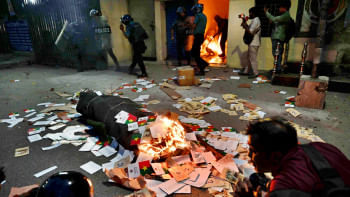Mollah, his men killed poet, family

Another prosecution witness told the International Crimes Tribunal-2 that Jamaat leader Abdul Quader Mollah and his accomplices had killed pro-liberation poet Meherun Nesa, her mother and two brothers at their home in Mirpur during the war.
Fourth prosecution witness poet Quazi Rosy, who was a close friend and a neighbour of Meherun Nesa, said even though Meherun appealed for life embracing the holy Quran, they slit the throat of all of them.
The 63-year-old witness said she had heard about the brutal killings from people on March 27, 1971, evening, the day of incident, and after the Liberation War she heard it from two non-Bangalee Biharies of Mirpur.
On July 10, Syed Shahidul Haque Mama, a freedom fighter and the second prosecution witness in the crimes against humanity case, also said Quader Mollah and his accomplices had killed Meherun Nesa and her family members during the Liberation War.
On May 28, the tribunal indicted the Jamaat assistant secretary general on six charges of crimes against humanity, including murders and mass killings.
Yesterday, the three-member tribunal, led by its Chairman Justice ATM Fazle Kabir with members Justice Obaidul Hassan and Judge Md Shahinur Islam, also recorded the cross-examination of Rosy before it adjourned the case proceedings until tomorrow.
During her 50-minute testimony yesterday, Rosy said Meherun accompanied her most of the time of the pre-liberation period. “We had formed an action committee to resist oppression against Bangalees in Mirpur [before the war]. I was the president and Meherun and many others were members of the action committee,” said Rosy.
After Bangabandhu Sheikh Mujibur Rahman's March-7 speech in 1971, which was a call for liberation, enmity between Bangalees and non-Bengalees intensified, said the witness, adding, “Under the circumstances, we continued to hold meetings regularly.”
“On the morning of March 25, 1971, we had a meeting and apprehended that something was going to happen,” said Rosy.
“When, I reached home after the meeting, I got information that my home was going to be raided along with Meherun's home,” Rosy said, adding, “Because, we were the female members of the action committee.”
Rosy said she had sent a message to Meherun asking her to leave home but Meherun sent her brother to Rosy with the message, “Where would they [Meherun Nesa, her mother and two brothers] go?”
“Afterwards, I left Mirpur but Meherun did not leave Mirpur and on the evening of March 27, I got information that Quader Mollah and his accomplices wearing red and white bandanas entered Meherun's house around 11:00am,” said Rosy.
“Seeing them, Meherun embraced a holy Quran firmly and pleaded for life but they slit the throat of all four of them [Meherun Nesa, her mother and two brothers],” added emotion-chocked Rosy.
“She was my friend but I could not do anything for her,” lamented Rosy.
“They entered the house under the leadership of Quader Mollah on that day I could not say weather Quader Mollah had entered the house or not,” said the witness.
Rosy said after the Liberation War, non-Bangalee Gulzar and another Bihari also told her about the incident.
“After killing Meherun, they tied her severed head to the ceiling fan with her hair and her beheaded body wriggled like a slaughtered chicken,” said Rosy, quoting the non-Bangalee Biharies.
Rosy said Quader Mollah was the leader of Islami Chhatra Sangha at that time and under his leadership, local non-Bangalees had taken part in the election campaign for Ghulam Azam, the then ameer of East Pakistan Jamaat-e-Islami and a candidate of Mirpur area. Ghulam Azam is currently an accused at the International Crimes Tribunal-1.
At the end of her testimony, Rosy, quoting a poem of Mahbubul Alam Chowdhury, the writer of the first poem on 'Ekushey', said, “Kandte ashini, phashir dabi niye eshechhi [haven't come here to cry, but to demand death by hanging]. I want trial of war criminals. I have lived this long to say something at this holy place [the court].”
“I have been suffering from cancer for the last 19 years. If I die after leaving this room [tribunal], then I have an appeal to you [tribunal], try the war criminals,” said emotion-chocked Rosy.
Ekramul Huqe, defence counsel of Quader Mollah, cross-examined the witness for 20 minutes and asked around 20 questions mostly on her educational background. Following his time plea, the tribunal adjourned the proceeding until tomorrow when the defence would continue cross-examining Rosy.

 For all latest news, follow The Daily Star's Google News channel.
For all latest news, follow The Daily Star's Google News channel. 



Comments